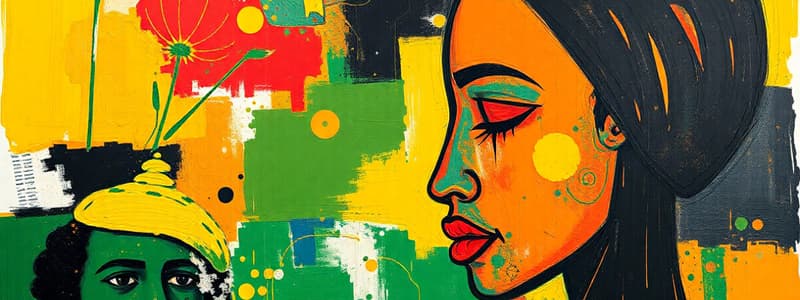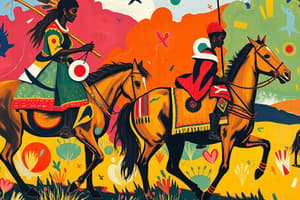Podcast
Questions and Answers
What was the outcome of the commission's first investigation regarding the man's hut?
What was the outcome of the commission's first investigation regarding the man's hut?
- The man was asked to leave the jungle.
- The man was given ownership of the hut.
- Mr. Elephant was allowed to occupy the hut. (correct)
- The hut remained unoccupied.
What did the man do after Mr. Rhinoceros took over his new hut?
What did the man do after Mr. Rhinoceros took over his new hut?
- He called for another commission.
- He left the jungle.
- He contested the commission's decision.
- He built a bigger and better hut. (correct)
What does the phrase 'Peace is costly, but it's worth the expense' suggest?
What does the phrase 'Peace is costly, but it's worth the expense' suggest?
- Maintaining peace requires a trivial effort.
- Peace is always guaranteed in conflict situations.
- Achieving peace necessitates a high level of commitment. (correct)
- Peace can only be achieved cheaply.
What criticism does the narrative make about the judge's approach in 'Instant Justice'?
What criticism does the narrative make about the judge's approach in 'Instant Justice'?
How did the defendants in 'Instant Justice' feel about the legal procedures?
How did the defendants in 'Instant Justice' feel about the legal procedures?
What role does Mr. Elephant claim to fulfill in the narrative?
What role does Mr. Elephant claim to fulfill in the narrative?
What happened during the dispute over the man's bigger hut?
What happened during the dispute over the man's bigger hut?
What does the term 'pachyderm' refer to in the context of the content?
What does the term 'pachyderm' refer to in the context of the content?
What significance does the persona attach to her name?
What significance does the persona attach to her name?
What does the metaphor comparing her name to 'trash' imply?
What does the metaphor comparing her name to 'trash' imply?
Which line reflects the persona's pride in her cultural background?
Which line reflects the persona's pride in her cultural background?
What role does the bureaucrat represent in the poem?
What role does the bureaucrat represent in the poem?
What does the use of ellipses in lines 16-18 signify?
What does the use of ellipses in lines 16-18 signify?
How does the poet convey the emotional impact of the name change?
How does the poet convey the emotional impact of the name change?
What does the phrase 'music to his ears' suggest about the bureaucrat’s reaction?
What does the phrase 'music to his ears' suggest about the bureaucrat’s reaction?
What underlying theme is present in the persona's resistance to the name change?
What underlying theme is present in the persona's resistance to the name change?
What does Binaay's change to Christina symbolize in the context of her cultural identity?
What does Binaay's change to Christina symbolize in the context of her cultural identity?
In what way does the phrase 'what’s in a name?' relate to cultural identity?
In what way does the phrase 'what’s in a name?' relate to cultural identity?
What is the primary conflict in the story 'Gentleman of the Jungle'?
What is the primary conflict in the story 'Gentleman of the Jungle'?
What does the lion's proclamation of himself as the King of the Jungle suggest about the theme of power?
What does the lion's proclamation of himself as the King of the Jungle suggest about the theme of power?
What does the title 'The Secret Language' imply about the speaker's cultural memories?
What does the title 'The Secret Language' imply about the speaker's cultural memories?
What role does nostalgia play in the context of Binaay's character?
What role does nostalgia play in the context of Binaay's character?
What underlying message is conveyed through the exclusion of the man from the Commission?
What underlying message is conveyed through the exclusion of the man from the Commission?
How does the concept of 'local color' enhance the storytelling in 'Gentleman of the Jungle'?
How does the concept of 'local color' enhance the storytelling in 'Gentleman of the Jungle'?
What aspect of the judge's behavior highlights the inefficiency of the legal system?
What aspect of the judge's behavior highlights the inefficiency of the legal system?
How does the story critique the nature of legal punishments?
How does the story critique the nature of legal punishments?
What does the judge's preoccupation with catching the train reveal?
What does the judge's preoccupation with catching the train reveal?
What does the term 'natural crimes' refer to in the context of the old man's situation?
What does the term 'natural crimes' refer to in the context of the old man's situation?
What does the judge prioritize over dispensing fair justice?
What does the judge prioritize over dispensing fair justice?
What challenge do poor and illiterate defendants face in understanding the law?
What challenge do poor and illiterate defendants face in understanding the law?
In what way is the old man's understanding of the law portrayed?
In what way is the old man's understanding of the law portrayed?
What significance does the phrase 'Good meat, sir – ribs and kidneys!' hold in the narrative?
What significance does the phrase 'Good meat, sir – ribs and kidneys!' hold in the narrative?
What was the primary goal of Apartheid in South Africa?
What was the primary goal of Apartheid in South Africa?
Which of the following laws was NOT part of the Apartheid system?
Which of the following laws was NOT part of the Apartheid system?
What does Cultural Emancipation refer to?
What does Cultural Emancipation refer to?
Which aspect of Apartheid laws impacted education?
Which aspect of Apartheid laws impacted education?
What specifically was required from black individuals as part of the Apartheid laws?
What specifically was required from black individuals as part of the Apartheid laws?
In Luisa Igloria's poem 'The Secret Language', what imagery is primarily used?
In Luisa Igloria's poem 'The Secret Language', what imagery is primarily used?
What is a common practice emphasized in the Apartheid laws regarding marriage?
What is a common practice emphasized in the Apartheid laws regarding marriage?
Which statement accurately reflects the theme of cultural identity in the poem?
Which statement accurately reflects the theme of cultural identity in the poem?
Study Notes
Magoleng wa Selepe Poem: Name and Identity
- The poem centers on the speaker's powerful and meaningful Xhosa name, Nomgqibelo Ncamisile Mnqhibisa, which is forcibly replaced with "Maria" by a bureaucrat.
- The speaker's pride in her name stems from its ancestral connection and cultural significance.
- The contrast between the speaker's traditional name and the imposed "Maria" highlights the oppression of cultural identity.
- The bureaucrat's dismissive attitude towards the speaker's name symbolizes the colonial power's attempts to erase indigenous cultures.
- The use of ellipses (...) at the end emphasizes the speaker's powerlessness and submission to the name change.
- The poem utilizes metaphor ("trash") and impactful diction to convey the speaker's emotional distress.
Apartheid in South Africa
- Apartheid was a system of racial segregation and discrimination enforced in South Africa for approximately 50 years.
- It divided the population into racial groups (white, black, Indian, and Coloured), with severe limitations on the rights of non-whites.
- Legalized forms of discrimination were enforced through approximately 148 laws, including strict ID requirements, curfews for black citizens, the prohibition of interracial marriage, restrictions on worker's rights, and segregated education systems.
The Secret Language Poem: Cultural Loss and Assimilation
- The poem depicts a woman who has adopted the speech and customs of a foreign culture ("fair stranger," possibly representing colonizers).
- Her “surrendered inheritance,” the beads, symbolizes her lost cultural heritage.
- The speaker's name change from Binaay to Christina represents her assimilation into a different culture.
- Nostalgia for her original identity and cultural heritage is expressed through memories of her father and her native name.
- The poem's title, "The Secret Language," refers to the speaker's hidden cultural identity, memories, and emotions.
What's in a Name?
- Personal names hold cultural and personal significance for both the namer and the named.
- Cultural traditions greatly influence the practice of commemorative naming.
- The quote "What's in a name? That which we call a rose by any other name would smell as sweet" suggests that the essence of something remains unchanged despite a name change.
Local Color in Literature
- Local color writing focuses on the distinct characteristics and peculiarities of a specific place and its people.
Gentleman of the Jungle: Fable about Justice and Power
- The fable uses the story of a dispute between an elephant and a man over a hut to illustrate the unfairness of a system favoring powerful entities.
- The lion, as King, establishes a commission to resolve the dispute, but this commission lacks representation for the man.
- The commission, composed solely of animals, prioritizes the elephant's perspective and consistently rules in its favor.
- The man's attempts to build new huts are continuously disrupted by other animals.
- The man's ultimate act of burning down the hut, along with the animals, symbolizes a rejection of a system that denies fair justice. The resolution highlights the cost of peace and the necessity of fighting for fair treatment. Irony is present in how the powerful animals claim to act justly while consistently favoring their own kind.
Instant Justice: Critique of a Corrupt Legal System
-
The story satirizes an impersonal and inefficient judicial system where speed trumps justice.
-
The judge prioritizes expediency over fairness, hastily judging cases without fully considering the circumstances of defendants.
-
The story exposes the legal system's alienation from poor and uneducated defendants who often don’t understand the complexities of the law.
-
The judge's focus on obtaining food provisions before leaving town highlights his moral corruption and indifference to the plight of the defendants and the weight of justice. The "good meat" line represents the judge prioritizing personal gain over his duties.
-
A crucial aspect of fair decision-making is considering all sides of a situation and understanding the contexts of individual circumstances. The old man's case (stealing his own wheat due to hunger) perfectly illustrates this.
Studying That Suits You
Use AI to generate personalized quizzes and flashcards to suit your learning preferences.
Related Documents
Description
Explore the deep themes in 'Magoleng wa Selepe', focusing on the significance of names, cultural identity, and the impact of colonialism. This quiz prompts critical thinking about the emotional weight of the speaker's traditional name versus the imposed identity. Analyze key literary devices like metaphor and diction that illuminate the struggle for cultural recognition.




